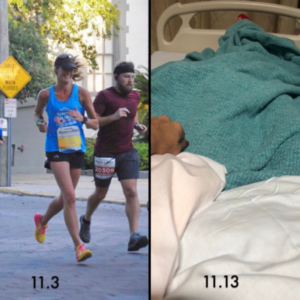Meet Gretchen Schoenstein: 100 Reasons to Celebrate
Gretchen Schoenstein’s autoimmune disease journey began when she was just 9 years old and was diagnosed with what was previously classified as a soft tissue disease, and now has been determined to be autoimmune in nature. At age 12, Gretchen was diagnosed with Hashimoto’s Thyroiditis. This diagnosis was elusive, with doctors often mistaking her symptoms for mononucleosis. “The symptoms overlapped, and the doctors assumed I was too young to have Hashimoto’s,” Gretchen recalls.
A Major Health Crisis Sidelines, and Then Spurs, Her Passion for Running
Years after her Hashimoto’s diagnosis, Gretchen encountered a significant health crisis, ultimately diagnosed as sarcoidosis. This period was marked by pain and uncertainty, including six weeks of immobility and eight days on a morphine drip. Even then, determining the exact nature of her condition required the involvement of multiple hospital departments, as it was initially narrowed down to either lymphoma or sarcoidosis. Like many autoimmune patients, she endured dismissive responses from doctors and unhelpful ER visits.
As a runner, dealing with inflammation and asthma due to sarcoidosis presents unique challenges. Like all athletes, Gretchen relies on her joints and lungs, but the damage from sarcoidosis and her body’s propensity for inflammation make it a constant struggle to decide whether to push through or rest.
 Despite these challenges, Gretchen continues to navigate her autoimmune journey with determination, striving to find a balance between self-care and pursuing her passions. Just four years after her sarcoidosis diagnosis, she defied expectations by completing her first half marathon. Through numerous flare-ups and setbacks, she’s managed to rally her body and her mind enough to participate in several races that nobody thought her health would be able to withstand. In 2021, Gretchen reached a huge milestone of competing in 100 half marathons, showcasing her resilience and determination in the face of adversity.
Despite these challenges, Gretchen continues to navigate her autoimmune journey with determination, striving to find a balance between self-care and pursuing her passions. Just four years after her sarcoidosis diagnosis, she defied expectations by completing her first half marathon. Through numerous flare-ups and setbacks, she’s managed to rally her body and her mind enough to participate in several races that nobody thought her health would be able to withstand. In 2021, Gretchen reached a huge milestone of competing in 100 half marathons, showcasing her resilience and determination in the face of adversity.
Digging Deep to Find Strength and Resilience
Despite the challenges, Gretchen’s journey has given her immense strength. “While some of my personality may be labeled as ‘rebellious,’ it’s really that I’ve developed my own mantra while living with autoimmune diseases. ‘What else is possible?’ I am far stronger today for having gone through this journey,” she shares. This mindset has helped her persevere, dig deep to find strength, resilience and even gratitude.
Gretchen’s journey exemplifies resilience in the face of adversity. Her story is a testament to the strength found in perseverance, the importance of supportive relationships, and the power of community. Through her experiences, she continues to inspire others facing similar battles.
She emphasized, “I have multiple autoimmune diseases AND I can do hard things.”
The Importance of Effective Patient-Provider Relationships
 Gretchen emphasizes the importance of a strong relationship with her medical providers. “Your medical provider should be your ‘safe’ place to go when something is off, doesn’t feel right, or a flare-up is looming.”
Gretchen emphasizes the importance of a strong relationship with her medical providers. “Your medical provider should be your ‘safe’ place to go when something is off, doesn’t feel right, or a flare-up is looming.”
“Many autoimmune patients feel unseen or unheard and even dismissed. It’s critical to find providers who believe you and address your physical issues without judgment,” she says. Maintaining these relationships helps ensure she has advocates who understand her lifestyle and needs.
Gretchen’s powerful perspective is that while she doesn’t know more than the doctors about the conditions she’s living with, she does know her body better than anyone else, and it’s become critical that she listens to her body and addresses things as soon as they start to feel off so she doesn’t experience additional health crises.
Gretchen’s Advice for Autoimmune Patients
Be Your Own Advocate
Gretchen advises being your own best advocate. Getting a diagnosis can be difficult, and not every doctor will understand your symptoms. Push for the best care and be an expert in your body. Recognize signs of impending flare-ups to reduce their severity.
Set Goals
 Having goals can provide motivation and strength. “I’m not suggesting everyone should run a half marathon, but having a goal that pushes your boundaries shows you what you can still do,” Gretchen notes. “Goals give me a sense of possibility and are a source of strength, allowing me to live a fuller life while also managing my health.
Having goals can provide motivation and strength. “I’m not suggesting everyone should run a half marathon, but having a goal that pushes your boundaries shows you what you can still do,” Gretchen notes. “Goals give me a sense of possibility and are a source of strength, allowing me to live a fuller life while also managing my health.
Find Community and Support
Joining a community of individuals with autoimmune conditions is invaluable. It raises awareness, combats misunderstandings, and reduces the stigma of invisible illnesses. Sharing experiences and supporting one another fosters a sense of belonging and empowerment.
Gretchen said, “Don’t be afraid to ask for help. That includes finding a support group or working with a therapist to help better adjust – and thrive – to your new normal.”
Join our email list
Receive the latest blog articles, news, and more right to your inbox!
Related articles you might be interested in

Finding Purpose on the Trail: A Father’s Journey Through the Shenandoah for His Daughter and the Autoimmune Association

Meet Erika: Battling 6 Autoimmune Diseases—and Advocating for Millions

Art with a Mission: John von Bergen Gives Back to Autoimmune Community Through Sales

Meet Makenzie: A Young Adult with Autoimmune Disease Navigating Life, Uncertainty, and Hope
Find more resources on autoimmunity
Learn more about autoimmunity, diagnosis tips, how to find a physician, and more.